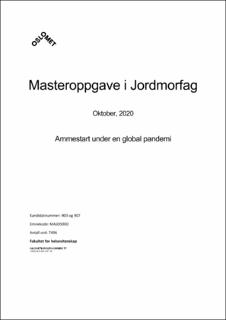| dc.contributor.advisor | Henriksen, Lena | |
| dc.contributor.author | Thorsteinsen, Cathrine | |
| dc.contributor.author | Stette, Ann Helen Høghjelle | |
| dc.date.accessioned | 2021-05-25T07:50:37Z | |
| dc.date.available | 2021-05-25T07:50:37Z | |
| dc.date.issued | 2020 | |
| dc.identifier.uri | https://hdl.handle.net/11250/2756167 | |
| dc.description.abstract | Hensikt: Å gi et innblikk i førstegangsfødendes ammestart under en periode hvor rutinene i føde- og barselomsorgen har vært endret. Dette vil kunne gi grunnlag for å vurdere om helsevesenet har klart å fremme amming i tråd med Mor-barn-vennlig standard mens smitteverntiltakene var på det strengeste.
Problemstilling: Har smitteverntiltakene under koronapandemien påvirket hjelpen førstegangsfødende fikk med amming, og hvordan har det gått med ammestarten?
Metode: Deskriptiv tverrsnittstudie med spørreskjema til førstegangsfødende som fødte mellom 12 mars og 12 mai 2020.
Resultat: Til sammen ble 821 kvinner inkludert i analysene. Av disse opplevde halvparten å få god ammehjelp. Kvinnene i studien hadde fått lite informasjon og veiledning under barseloppholdet. De var i stor grad fornøyd med hjelpen de fikk etter utskrivelse fra barselavdelingen. Halvparten av kvinnene rapporterte å ha gitt morsmelkerstatning i løpet av de tre første levedøgn. Omtrent 70% av kvinnene i studien fullammet to uker etter fødsel. Om det var gitt morsmelkerstatning var den faktoren som hadde størst innvirkning på om mor fullammet.
Konklusjon: Ammehjelpen førstegangsfødende har fått i denne perioden, har ikke vært etter Mor-barn-vennlig standard. Man kan derfor anta at smitteverntiltakene har hatt en negativ innvirkning. Økt bruk av morsmelkerstatning blant kvinnene i denne studien er forbundet med en lavere andel som fullammer to uker etter fødse | en_US |
| dc.description.abstract | Aim: To assess first-time mothers’ initiation of breastfeeding during a time of changed routines in maternity care services. This will help to evaluate the impact infection control measures had on the promotion of breastfeeding in healthcare settings.
Research question: Have the infection control measures during the corona pandemic affected the breast-feeding support first-time mothers received, and what is the impact on breastfeeding initiation?
Method: Descriptive cross-sectional study with a questionnaire to first-time mothers who gave birth between March 12th and May 12th, 2020.
Results: 821 women were included in the analyses. Half of these women reported that they to a large extent received help with breastfeeding. The women got insufficient guidance and information on breastfeeding in maternity wards. They were largely satisfied with the support they got after being discharged. Almost half of the women in this study reported that their child had been given breastmilk substitutes during the first three days after birth. Approximately 70% of the women breastfeed exclusively two weeks after birth, and the factor with the greatest impact on exclusive breastfeeding, was the use of breastmilk substitutes.
Conclusion: The support first-time mothers were given during the corona pandemic have not been according to the “Ten steps to successful breastfeeding”. Because of this there is reason to assume that the infection control measures have had a negative impact on breastfeeding initiation. The increased use of breastmilk substitutes in this study is the factor that had the greatest impact on exclusive breastfeeding rates two weeks after birth. | en_US |
| dc.language.iso | nob | en_US |
| dc.publisher | OsloMet - storbyuniversitetet | en_US |
| dc.relation.ispartofseries | MAJO;2020 | |
| dc.title | Ammestart under en global pandemi | en_US |
| dc.title.alternative | Learning to breastfeed during a global pandemic | en_US |
| dc.type | Master thesis | en_US |
| dc.description.version | publishedVersion | en_US |
